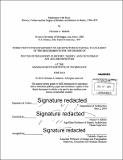Modernism with style : history, culture and the origins of modern architecture in Berlin, 1780-1870
Author(s)
Hedrick, Christian A. (Christian Andrew)
DownloadFull printable version (84.00Mb)
Other Contributors
Massachusetts Institute of Technology. Department of Architecture.
Advisor
Nasser 0. Rabbat.
Terms of use
Metadata
Show full item recordAbstract
This dissertation traces the continual, but overlooked, impact of Islamic architecture on practicing architects in nineteenth-century Berlin. As such, it examines the origins of Modernism by considering design strategies by architects in post-Schinkel Berlin. The reasons and motivations for this interest in Islamic architecture by German architects are not easily connected to imperial prerogatives. Rather, this dissertation argues that the use and interpretation of Islamic architectural forms by German architects during this period-often characterized as a "crisis of style".-provide insight into Germany's uncertain path to Modernism in the twentieth century. Lost within the historiography of style debates during the first half of the century, which sought to establish a new style appropriate for a modem industrial society, existed proposals that rejected both trends of an uncritical eclecticism and pure industrial abstraction. These architects sought a solution to this crisis by challenging the cultural aspects of style. Thus, it was through the study of Islamic architecture that some German architects found an unlikely answer, which differed from those proposed by advocates of design reform in contemporary Britain. For some, Islamic architecture came to be understood as sharing a common ancestry in classical antiquity, yet it was different and abstract enough such that it would not be closely associated with either the Neoclassical or Gothic. As such, Islamic forms were unlikely to be associated with the political, ideological and religious ideas so ingrained in Europe's architecture. This dissertation alters traditional understandings of Modernism by demonstrating how this "path," ultimately not taken, can be used to reconceptualize our understanding of what Modernism is, was, or could have been. Thus, instead of attempting to establish a different type, or "alternative"' Modernism, the dissertation challenges the historiography of the modern canon significantly in order to understand Modernism as a global condition, while simultaneously rejecting the inherited limits of the term 'modern' as a formal or stylistic category only. By exploring what these architects sought outside of Europe, and studying how they integrated what they found into their work during the rapidly changing nineteenth century, this dissertation significantly challenges Modernism's established historiography.
Description
Thesis: Ph. D. in History, Theory, and Criticism of Art and Architecture, Massachusetts Institute of Technology, Department of Architecture, 2014. Cataloged from PDF version of thesis. Includes bibliographical references (pages 474-493).
Date issued
2014Department
Massachusetts Institute of Technology. Department of ArchitecturePublisher
Massachusetts Institute of Technology
Keywords
Architecture.